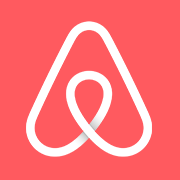Know Your Numbers, Grow Your Income: Understanding Airbnb Fees for Small-Scale Hosts
A thorough understanding of Airbnb fees, combined with a strategic approach to pricing and cost management, is crucial for small-scale hosts to maximize their income and achieve their financial goals.
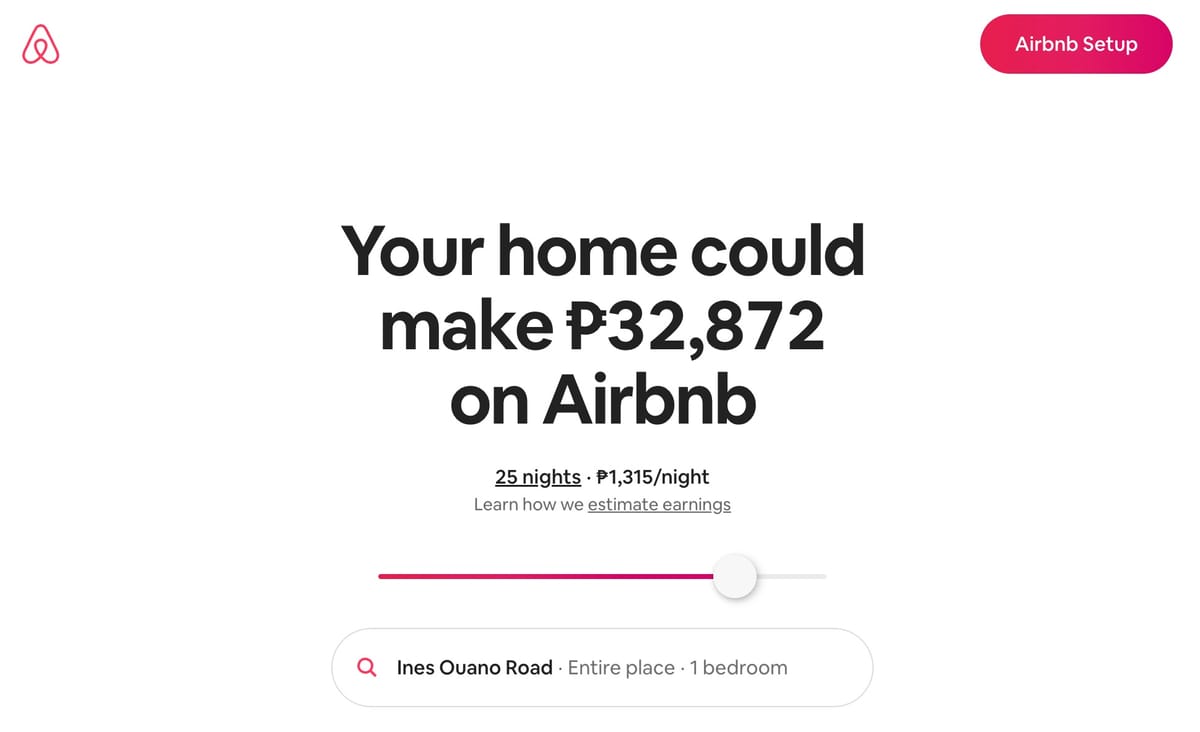
Putting up your spare condo unit for short-term rental helps cover mortgage payments and condo dues, and if you do it right, it can generate extra income for you.
However, be aware that fees and hidden costs can impact your profitability. This is particularly true for small-scale hosts with just one unit, like me. With some practical strategies, the potential for profit is promising. Renting out a 1-bedroom condo unit for two years in Mandaue City, Cebu, I've gained valuable insights into Airbnb fees, hidden costs, and practical strategies to boost my earnings. I'm excited to share some of these tips with you.
Airbnb Fees: What Hosts Need to Know
Like most booking platforms, Airbnb applies fees ranging from 3% to 15% to hosts and guests. Understanding these charges can help a host in choosing pricing and promotional strategies.
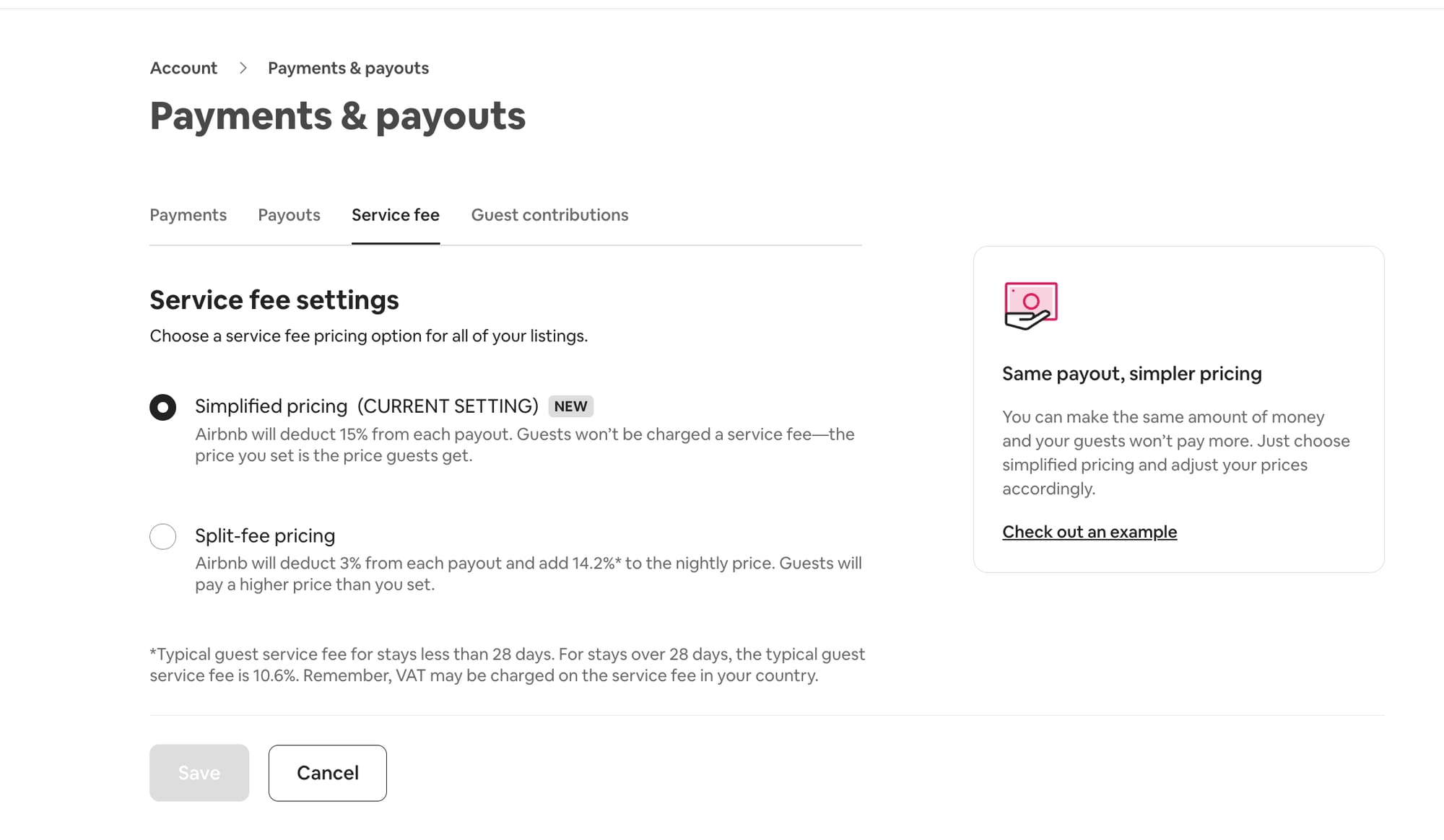
How Much Does Airbnb Take From Hosts?
Airbnb deducts a host service fee, which is a percentage of the total booking amount. All booking platforms I know of do this to keep the app/web app running smoothly. They act like a middleman, taking their cut in every transaction.
Two pricing models exist in Airbnb:
- Split-fee pricing: Hosts pay around 3%, and guests pay 14.2%.
- Host-only fee model (or Simplified Pricing): Hosts cover the entire 15%, making listings look more affordable to guests (Because it is! The price you set is the price guests see).
My experience choosing Simplified Pricing or Host-only fee model: I experimented with both split-fee and host-only fee. Initially, I couldn't use the Simplified Pricing because I was yet to become a Superhost. I used to check other listings to see their prices, and I found that a lot of seasoned hosts don't charge guests a booking fee. This is why I decided to opt for Simplified Pricing later on when I could. This automatically cuts 15% from my earnings. When I looked at my financial report and compared my earnings between Split-fee and Simplified Pricing, I noticed that while I earned more with Split-fee pricing, I didn't get as many bookings as when I switched to Simplified Pricing. This host-only fee is much more attractive to guests and is the more sustainable option for me. I like to think of it as Booking.com's commission fee—they take out the 15% from the hosts without an option to pass it on to guests.
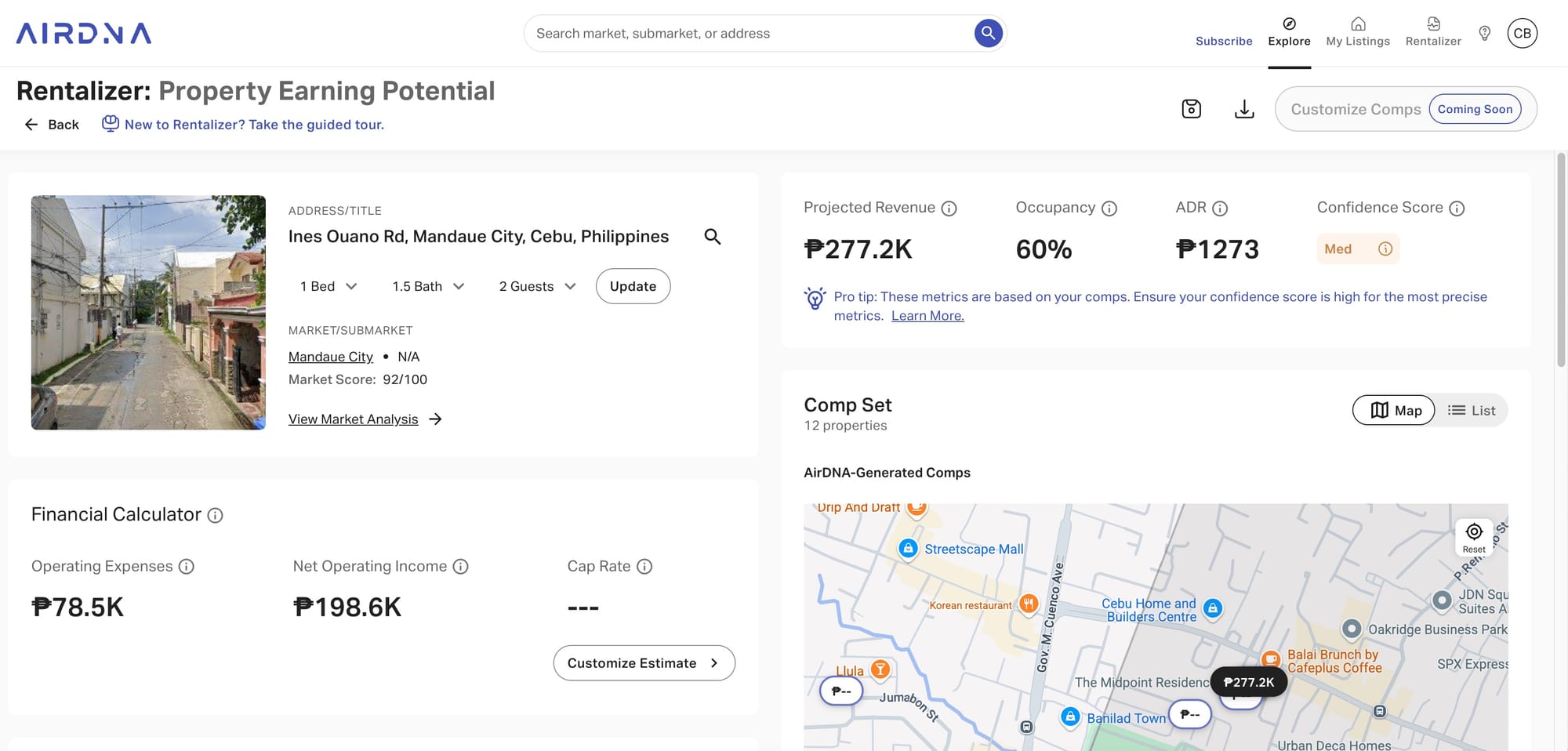
How Much Do Airbnb Hosts Really Make?
Earnings vary by location, occupancy rate, and expenses. Many Airbnb revenue calculators show high earnings, but actual take-home profit is often much lower due to platform fees, maintenance, and guest-related costs.
It's common for new hosts to have high expectations about their potential earnings from Airbnb. I was no different. However, after my first year of hosting, from June 2023 to June 2024, I've realized that the actual take-home profit, while not as high as initially expected, is still quite promising.
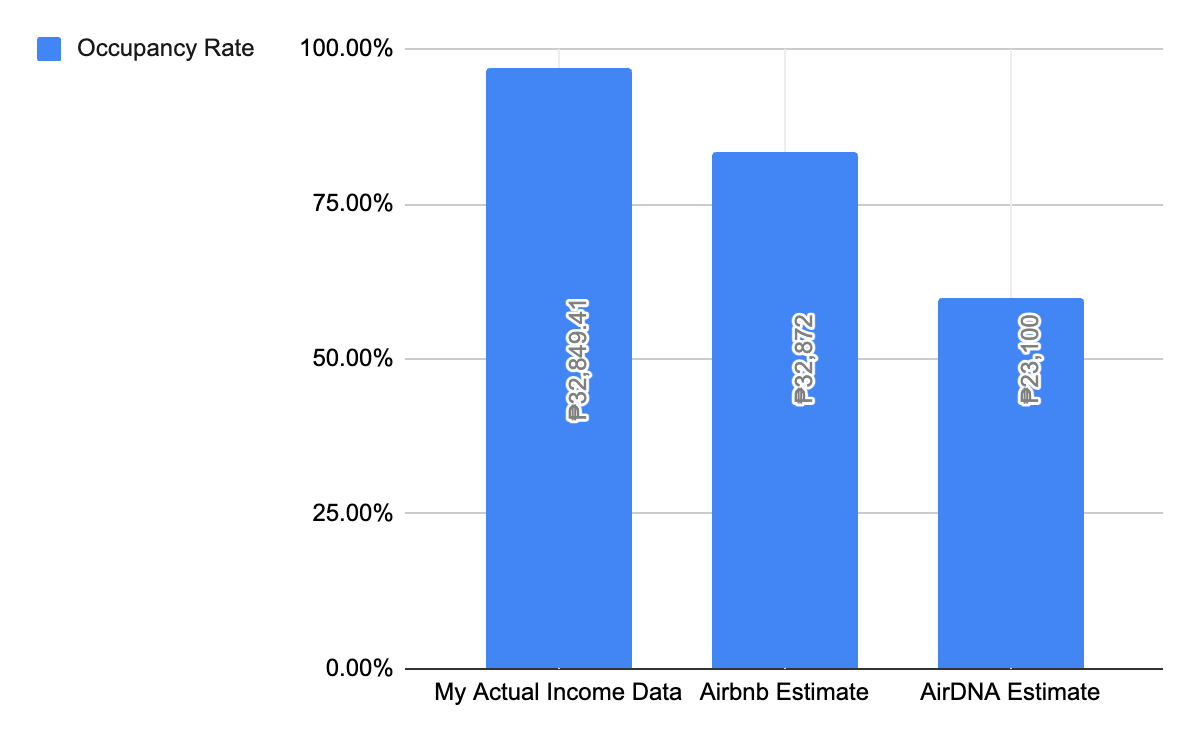
My actual total revenue for the first year was ₱394,192.96. Interestingly, Airbnb's direct monthly revenue estimate was very close to my actual monthly revenue (₱32,872 vs. ₱32,849.41).
It's worth noting that AirDNA underestimated my performance. Their estimate for my total revenue was only ₱277,200. Similarly, AirDNA projected a 60% occupancy rate, while Airbnb estimated 83.3%. My actual occupancy rate turned out to be remarkably high at 96.85% in my first year.

During the first four months of my listing, I actively engaged in marketing efforts. Considering this, my total operating expenses for the year were higher. AirDNA, in comparison, estimated operating costs to be much lower at ₱78,500. This difference likely accounts for the discrepancy in our net operating income. My net operating income (profit) for the first year, minus mortgage costs, was ₱232,803.74. This is higher than AirDNA's profit estimate of ₱198,600.
My first-year performance met my revised goals, even though my initial earning expectations were too high. What does this mean? I can do either of these two: aim for a lower occupancy rate with a higher nightly rate or keep a high occupancy rate (above 90%) with prices between my current rate and Airbnb's projected rate per night (P1,200).
Recommended read: How Much Can You Really Earn Hosting an Airbnb in Mandaue City? (My Experience Revealed)
Guest Fees & Their Impact on Bookings
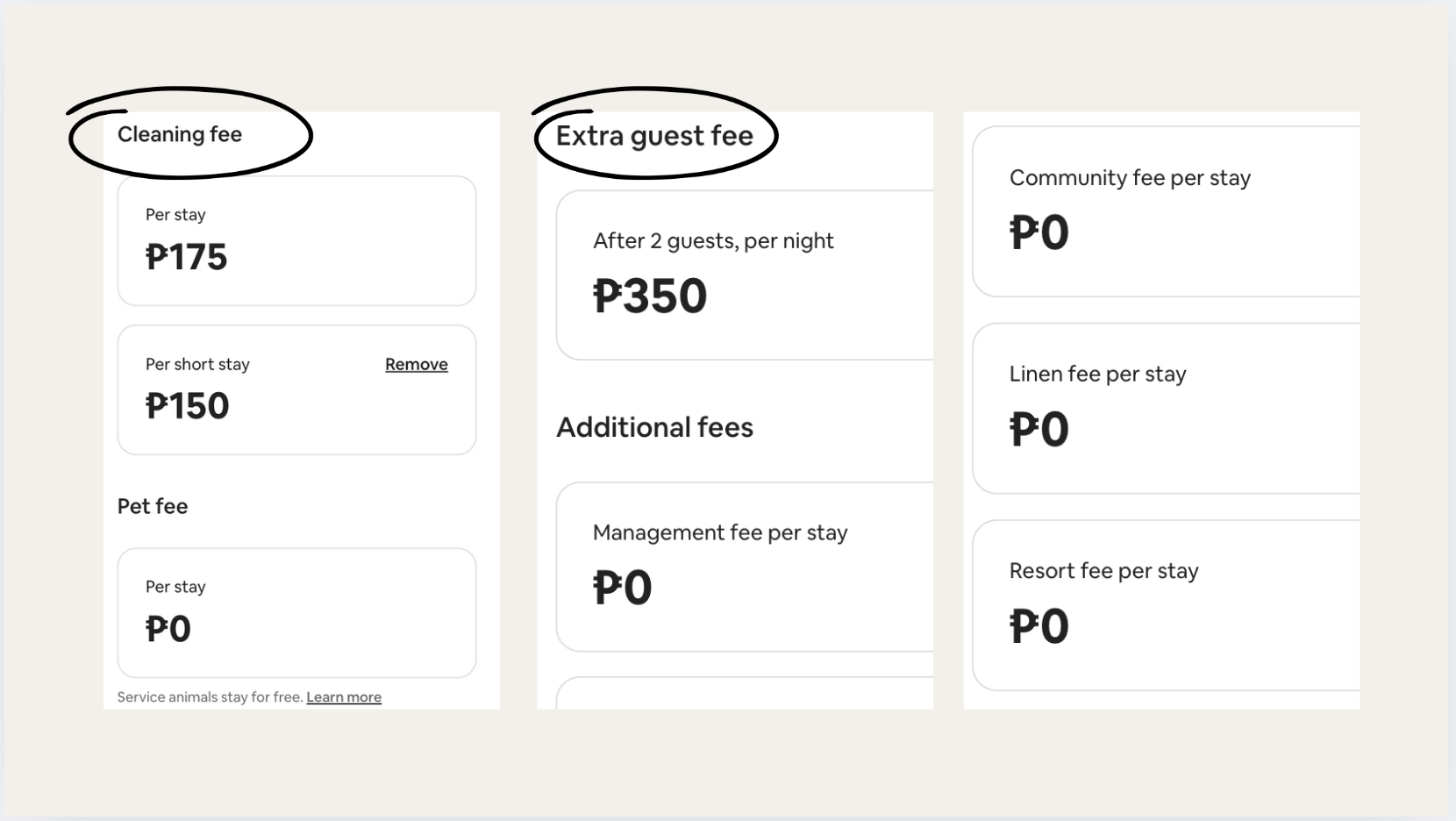
Guests also pay various fees, but hosts can control each of these charges. The fees a host can charge guests are:
- Cleaning fee. This fee covers cleaning between guests. You can choose a short-stay cleaning fee or a standard cleaning fee. Hosts can also decide to charge no fee at all. I recommend charging about half of what you would pay a cleaner. Many Airbnb hosts get a bad reputation for high cleaning fees, as guests usually expect a single clear price at checkout, like in hotels.
- Extra guest fee. Charged when more guests stay than the base occupancy. There is a minimum of at least ₱286 but no more than ₱17,150 that you can charge for this. I'd like to keep mine realistic, reflecting the cost of having an additional person in the unit. P350/extra guest is a good rate, but try not to charge more than P400 if it's a small 1-bedroom unit like mine.
- Security deposit: Airbnb prohibits hosts from charging security deposits directly through their platform or outside of it. Instead, guests are informed during booking that their payment method (credit card) may be charged for damages caused during their stay. The forms of security or protection come in Aircover for small-scale hosts. I was able to claim through Aircover for small items, and I know a few hosts who were able to charge for stained towels and sheets, smoking penalties, and more.
- Cancellation fees: The applicable cancellation fees are based on a host's selected policy and the timing of the cancellation. You can choose one from Airbnb's standard cancellation policies for stays of 27 nights or fewer:
- Flexible: This means a full refund if the guest canceled up to 24 hours before check-in. Later cancellations pay for nights stayed plus one extra night.
- Moderate: Full refund if canceled up to 5 days before check-in. Later cancellations pay for nights stayed, one extra night, and 50% of unspent nights.
- Firm: Full refund if canceled 30+ days before check-in. Cancellations 7-30 days before pay 50% for all nights. Cancellations within 7 days pay 100% for all nights.
Hosts can also offer a non-refundable option at a discounted rate for shorter stays. But it's good to note that these policies may be overridden in certain situations, and different policies may apply in specific locations/nationalities like Italy, South Korean guests with Strict policies, and Germany. California also has a 24-hour free cancellation period.
How I set guest fees: I charge a small cleaning fee because my nightly rate is mid-range, and I use simplified pricing. This way, guests save money by not paying a booking fee. I found that higher cleaning fees turn away potential guests, and when I tried removing the cleaning fee completely, it didn't increase my occupancy rate. So, I keep a minimal cleaning fee (P150 or higher). I don't charge a security deposit since I don't use a channel manager or software that can enable it. I can only charge security deposits for guests who book directly with me. I also set a high extra guest fee because I prefer having no more than two guests in the unit. As for the cancellation policy, I stick to Flexible because it helps my listing appear on top of the search results. To seal the deal, I also prefer to add a non-refundable option that gives guests a 10% discount. This option helps secure bookings and encourages guests to keep their reservations.
Also read: Top 10 Tips to Get Superhost Status on Airbnb in 3 Months (or Less!)
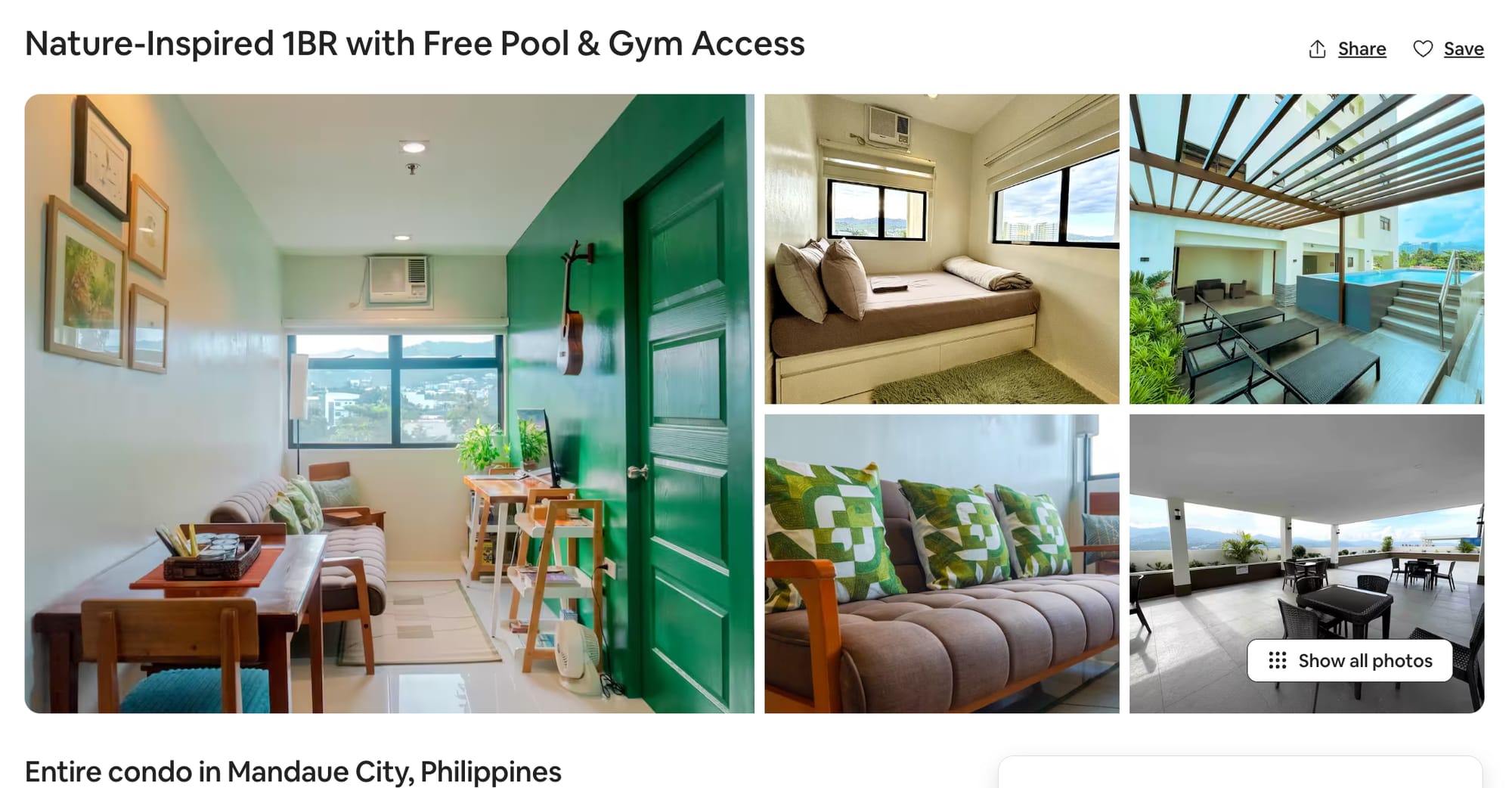
Hidden Costs of Hosting on Airbnb
Beyond Airbnb's service fees, a host needs to remember several potential costs that can eat into profits:
- Utility spikes: Guests may overuse air conditioning or electric cooktop, which can lead to higher electric bill.
- Maintenance & repairs: As I recounted in this blog post, things break more often than expected.
- Supplies: Essentials like soap, tea, coffee, and toilet paper add up. Keeping a record of these expenses helps hosts manage their finances.
- Insurance: Airbnb's Aircover isn't always enough. Consider costs from potential theft, broken appliances, and burnt or stained beddings.
Unexpected expenses I encountered: I recently wrote about the past four months of hosting and how most of my profits went to repair or replacement of essential items in the unit. It helps to keep earnings in one bank and leave enough for emergencies like a busted bidet, inspection fees, water heater replacement, stained towels, or oiled sheets. Sometimes, keeping track of items due for replacement makes more sense so the damage is lesser and the cost lower.
Recommended reading: Pro Tips for New Airbnb Hosts: The Fine Art of Discounts and Charges
Comparing Airbnb to Other Rental Platforms
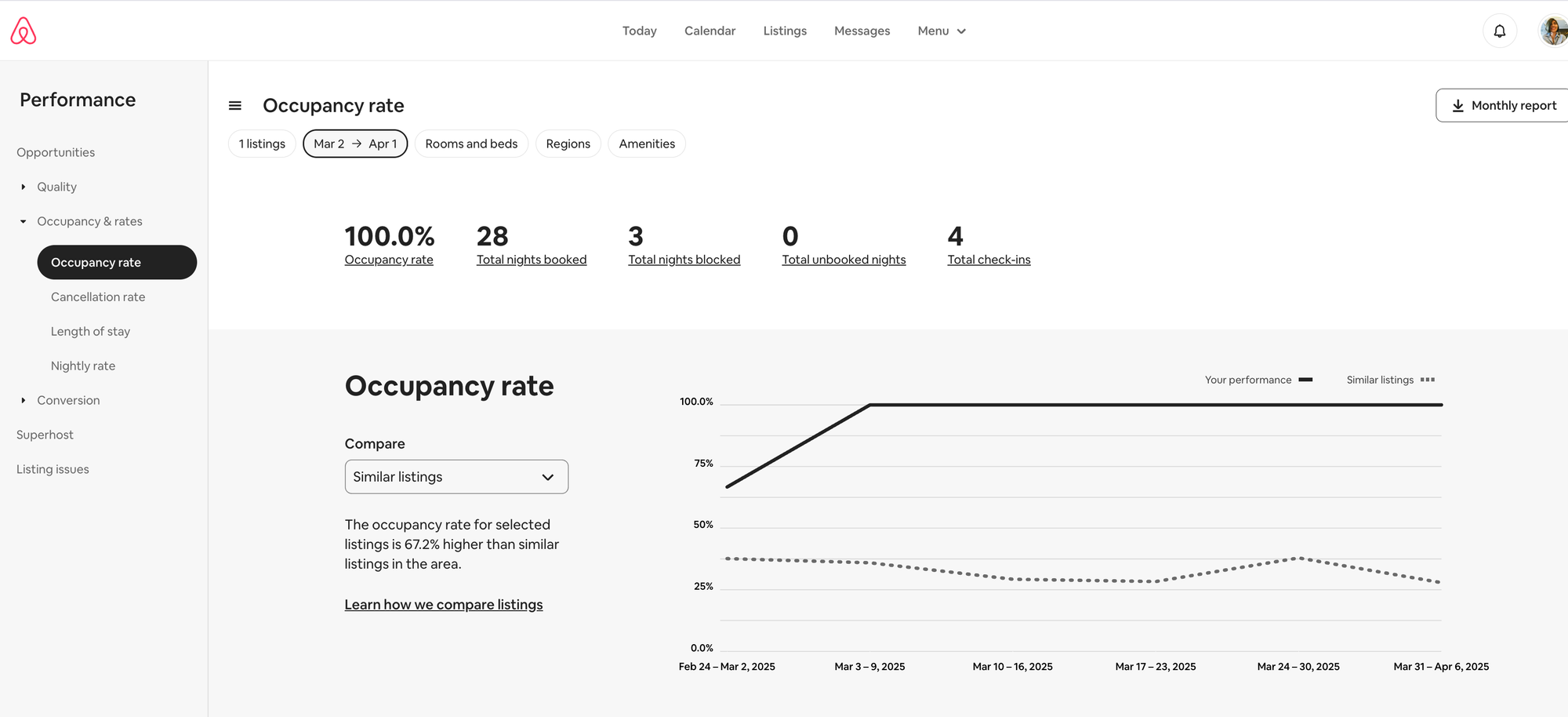
If you're managing just one unit, listing on all platforms (Agoda, Airbnb, and Booking) for short-term rental does not make sense. You'll divide your earnings among the platforms, and calendar management becomes more complicated. I have yet to find something similar to the support that Airbnb has to offer hosts. It's the only one where you can have an instant, direct contact with guests and AirCover (insurance) for potential damages.
Do Small Hosts Need Management Software?
Hosts of multiple properties often need channel managers and dynamic pricing software (Pricelabs), but these may not always be worth the cost for single-unit hosts.
Did I use automation tools? I initially tried a bunch of tools (e.g. Guesty, Lodgify, AirDNA, and Pricelabs) to improve Issa Suites' visibility. However, I learned that getting familiar with Airbnb's hosting dashboard takes some time, so I don't recommend new hosts or aspiring hosts use automation tools before they master the main Airbnb app.
Final Thoughts: Lessons Learned from Hosting One Unit
What is the biggest lesson from two years of hosting a short-term rental property? What would I do differently if I started again? I'd remain focused on what guests value and avoid doing what they usually complain about. I'll also keep learning and improving the unit as feedback comes in and try to anticipate what guests want.
Careful planning and strategic pricing can make renting out a spare unit on Airbnb worthwhile. Focusing on guest experience, cost control, and realistic pricing is key to success, even if you're a small-scale host.
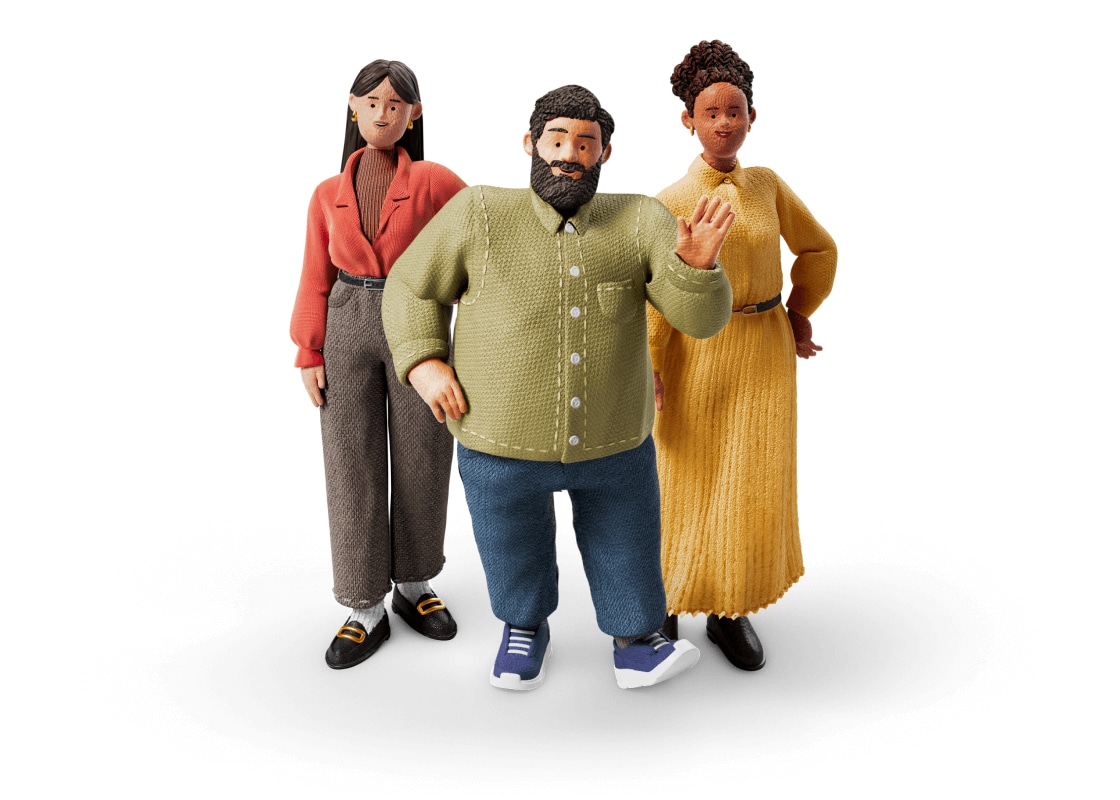
Related post: Airbnb Hosting in Cebu, Philippines: Pricing, Fees, & Cleaning Demystified

